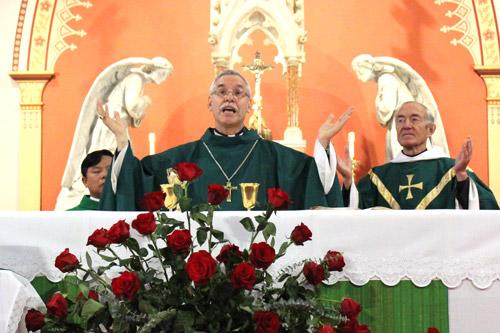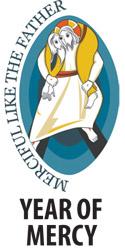

Being attentive to the word mercy in this Year of Mercy has given me a deeper awareness of God’s gift of himself at each Mass.
At each celebration we encounter mercy himself. We are a blessed people to have God’s great outpouring of love in the Eucharist. We get to hold mercy in our hands and take him into hearts. As we reflect upon this precious gift of God in this Year of Mercy the continual invitation is always there in the Mass to be transformed by him who is Mercy.
Sometimes, the bread we eat (Jesus) and the life we live doesn’t match. There is a contrast between the two. When we are hypocritical like this we are no better than the scribes and Pharisees that Jesus warned us about in the Scriptures. “Their lips pay me service says the Lord, but their hearts are far from me.” (Isaiah 29: 13)
I experienced this personally early in my priesthood. I got my feelings hurt by a parishioner and carried a lot of anger toward him. It never failed that this parishioner would always come to my line at Communion. It bothered me that I could hold Jesus in my hand and say to him, “the body of Christ” and yet have this bitterness and anger in my heart. I felt hypocritical. A brother priest invited me to pray for this person until God’s grace brought healing. It is a simple intention and one I began to do every morning and evening.
After some months in prayer I noticed a change. During Communion when I said, “the body of Christ,” there he was and my bitter feelings were gone. There was nothing but love, mercy and compassion in my heart. I knew it was not from me, but from him whom I was holding in my hand. This was a grace moment and one I believe the Holy Father is seeking from us, his Church in this Year of Mercy.
The Holy Father in “Misericordiae Vultus,” (“Face of Mercy”) mentions the celebration of the Mass several times in his document. God does show us his great power through the richness of his mercy. The Holy Father goes on to say, “Throughout the history of humanity, God will always be the one who is present, close, provident, holy and merciful.” And while Jesus was instituting the Eucharist as an everlasting memorial of himself and his paschal sacrifice, he symbolically placed this supreme act of revelation in the light of his mercy.
During the Mass we invoke the mercy of God through the penitential rite. We pray, “Lord have mercy, Christ have mercy, Lord have mercy,” and “this three-fold plea for God fittingly flows after the three-fold admission of one sin in the previous prayer, the Confiteor.” (“A Biblical Walk through the Mass” by Edward Sri). The Confiteor prayer we pray says “through my fault, through my fault, through my most grievous fault.” And the priest concludes the prayer by saying, “May almighty God have mercy on us forgive us our sins and bring us to life everlasting.” As we enter into the mysteries of God, we continually seek his mercy.
There are numerous other times throughout the celebration of the Mass when we call on God’s mercy: the Gloria, the deliverance prayer after the Our Father, the Lamb of God, in the private prayers of the priest and other moments. We hear the words directly from the mouth of John the Baptist, who was the first person to refer to Jesus as the Lamb of God, “Behold the Lamb of God, who takes away the sins of the world.” How fitting it is that we recite the Lamb of God at this precise moment in the Mass.
Jesus is the healing remedy for all the brokenness within us and that which we experience in the world around us. In Communion we receive Jesus who is mercy. The gift of the Year of Mercy is to be open to allow God’s mercy to transform us. In doing so as our Holy Father states, “This love has now been made visible and tangible in Jesus’ entire life. His person is nothing but love, a love given gratuitously. The relationships he forms with the people who approach him manifest something entirely unique and unrepeatable.” Each celebration of the Mass, we receive Jesus and his Mercy, which changes lives.
Please read our Comments Policy before posting.
Article comments powered by Disqus St. Timothy winner recommends adoration to other teens
St. Timothy winner recommends adoration to other teens
 Jesus’ best friends: Peter, James, the beloved disciple
Jesus’ best friends: Peter, James, the beloved disciple
 Parishes are deepening faith, bonds during revival year
Parishes are deepening faith, bonds during revival year
 Smaller Black Catholic community addressing challenges
Smaller Black Catholic community addressing challenges
 Studio 3:16 offers new approach to teaching religion
Studio 3:16 offers new approach to teaching religion
 After three decades, NLR principal plans to retire
After three decades, NLR principal plans to retire
 CHS athlete overcomes odds to reach collegiate goal
CHS athlete overcomes odds to reach collegiate goal
 John Calipari: UA basketball coach and devout Catholic
John Calipari: UA basketball coach and devout Catholic
 'Cabrini' film tells story of saint with great faith
'Cabrini' film tells story of saint with great faith
 St. Joseph a model of solidarity with immigrants
St. Joseph a model of solidarity with immigrants
 Two gifts after Jesus’ death: Virgin Mary and Eucharist
Two gifts after Jesus’ death: Virgin Mary and Eucharist
 Why we have an altar, and not just a communion table
Why we have an altar, and not just a communion table
 Pope: Wars should be resolved through nonviolence
Pope: Wars should be resolved through nonviolence
 Living relationship with Jesus Christ in the Eucharist
Living relationship with Jesus Christ in the Eucharist